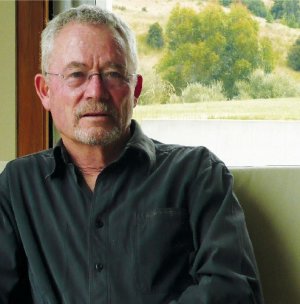Technically speaking, he was the first to pioneer wine there in modern times (post-1800s), but on the eve of his retirement from the industry, McCallum prefers to see himself as one of the first small group of pioneers in the region. Along with Clive Paton from Ata Rangi, Derek Milne from Martinborough vineyards and the late Stan Chifney of Chifney (now Margrain Vineyard), McCallum set out to see if the southern Wairarapa had the right weather, soil and geographic conditions in which to make high quality wine. And to judge by his success over the past three decades, it does. In 1979, McCallum and his wife, Dawn, bought a piece of land near the town, planted 100 vines on the free- draining gravel, and launched Martinborough's wine industry.
"I didn't set out to be different but certainly set out to make wine which was sourced in Martinborough and not a copy of what's done elsewhere; achieving individuality is, I think, my greatest achievement," he says.
"When we set up we decided that if we wanted to grow a grape there we had to really love it. My very first loves were Gewurztraminer and Pinot Gris, but that's not to downgrade any of the others. There are the difficult children and the easy children. The easy children I suppose, are the Rieslings and Syrahs of the world and the more difficult are the Gewürztraminers (crop sensitive and very temperamental). And Pinot Noir is always cranky in the winery," he says.
Wine awards were never something McCallum aspired to, even when starting out. From the outset, he focused on producing quality wines but says that: "I don't feel there's a connection between wines that show well at competitions and those that taste well on the dinner table. We prefer people to vote with their feet and wallets. Awards are a handy shortcut to being known. The slower way is for people to discover you and to become ardent followers."
The slower way was certainly the case for Dry River Wines, which sell most of its 26,000 bottles a year via mail order. The mail order service absorbed McCallum's time, but cut out the middleman, reducing overheads significantly. It also means you are not going to find a bottle of Dry River Wine in any supermarket, either here at home or overseas.
And looking forward? "I think the time has come for the boutique wine industry to have a hard look at itself and do the exciting things the big wineries won't; grow with a low cropping response to the terroir and explore new varieties and styles to offer the public something of real interest, which is different.
"Tempranillo, I think, is screaming to be seriously treated in a cooler climate. Graciano is another one. Dry River has played with it for a little while now. You have to ask yourself the same old question: what is going to do well in a cooler climate? I also think Roussanne from the northern Rhone is a great grape and for a place with a cool spring, like Martinborough, it could work extremely well," McCallum says.
While he and Dawn have moved 20 minutes' north west of Martinborough township, he says wine still fits into his daily life; "What I value in wine is not a tier of excellent, really good, almost made it and so on. It's like people. I talk to them and try to understand them for who and what they are. That's how I believe we should enjoy wine. Currently, I think New Zealand and much of the world has the Parkerish view that there is an ascending scale of greatness in wine. For me, it doesn't work like that."
McCallum is pursuing new projects, which involve travel to Africa and Ceylon, among other "exciting, exotic places".
This email address is being protected from spambots. You need JavaScript enabled to view it. ■










